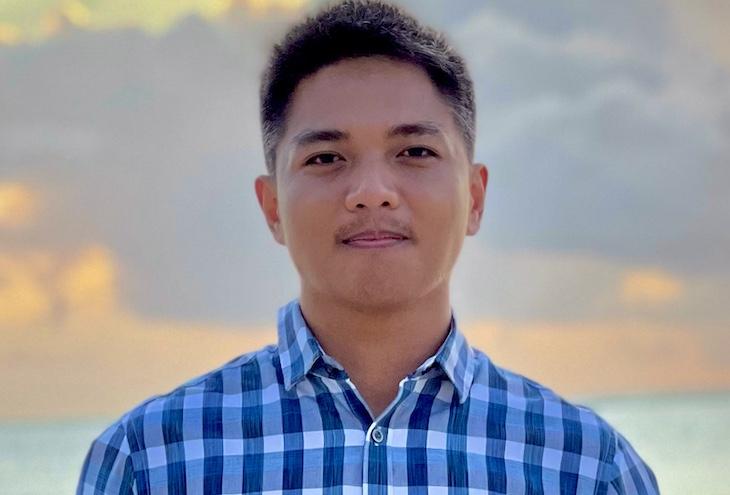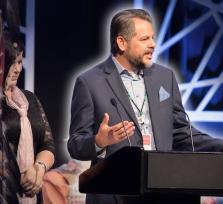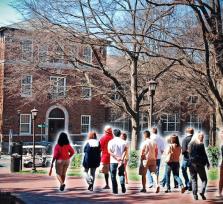Completing one bachelor’s degree is impressive, but Joseph Lance Casila completed three in four and a half years while at the University of Guam — a BS each in math, chemistry, and biology. Casila is resourceful. He left high school wanting to pursue his interest in engineering, but the University of Guam didn’t have a full engineering program. So he created a course of study to meet his needs. “My initial plan was to major in math and chemistry at the University of Guam and use those courses to fulfill some requirements in an online engineering program I was looking into,” he says.
Casila intended to pursue both programs at the same time, making use of the generous aid package his university had awarded him. “I was a little uneasy because there wasn’t a full engineering program at that time,” he explains. “But I didn’t feel hopeless because I knew I could make something out of the opportunity that was given to me.”
In the end, Casila decided against the online engineering program. After reading articles about regenerative medicine and tissue engineering, he tried a notoriously difficult intro to biology class with his friends. He did well in the class, so he applied for and landed a summer internship at the National Institutes of Health (NIH) in Phoenix, Ariz., where his work with polymerase chain reaction (PCR) machines sparked his interest in molecular biology. “That experience was also very special to me because the research used DNA samples of people from my island who I actually worked with during community service events,” Casila says. “I realized that I could apply my engineering skills in a field that focuses on helping treat people.”
After that summer program Casila became a triple major in math, chemistry, and biology, intending to approach biology from an engineering perspective. “I didn’t know there were schools in the United States offering programs called bioengineering and that I was mimicking their coursework,” he says. His recent acceptance into a bioengineering PhD program at the University of Pennsylvania confirmed for him that the triple major route didn’t get in the way of pursuing his goals.
Casila grew up on the island of Guam, a 212-square-mile U.S. territory in the western Pacific, with his parents and two older siblings. He didn’t worry about schoolwork until he began to apply himself in high school. He always knew that he was going to go to college, but he didn’t have a clear picture of what he was going to focus on once he got there.
Casila's parents trusted him to follow his passions when it came to higher education. “I had no pressure to do well in school because they already knew that I understood how important education is,” he says. As he looks toward the future, he says it’s important to give back to them for all they have given him. “My goal to pursue a career in science and engineering is part of giving back,” he explains.
Casila recalls that his teachers believed in him more than he believed in himself. Mrs. DeVera, one of his middle school teachers, believed that he was going to change the world. He didn’t think much of it at the time, but when he learned that he placed top five in his middle school despite not trying his best, her confidence in him began to resonate. As Casila moved into high school, her words inspired him to do his best. With his teachers’ support and his new resolve, he graduated at the top of his class.
The University of Guam awarded him the Merit Scholarship, which covered tuition for four years, with stipends for books and living expenses. That generous offer persuaded him to stay on the island for university, where he could live with his parents and where many of his fellow students had grown up in a similar culture.
His double, then triple, major came with an extensive workload. “My average courseload was about 22 credits per semester compared to our university’s regular 12-credit full-time student status,” Casila says. “I had to give up a lot of things and it was difficult to accept.” He had been active in his community during high school, and so it was hard to watch others participate in community organizations knowing he couldn’t join them due to classes.
Even after he learned to manage his time more efficiently, Casila was unable to participate in the way he wanted. “I had motivation, leadership experience, and ideas to lead student organizations,” he says. “I just didn’t have the time to fully commit. It was difficult imagining the things I could have done, but I had to let go.” Instead, Casila found some satisfaction in taking on mentorship and training roles, many of which would help lead him to where he is now.
In order to stay on track with classwork, Casila joined forces with his friends. Those who knew the topics best would take the lead to share their strengths with the group. When someone in the group fell behind, someone else would help them catch up. Their teamwork honed their weaknesses and maximized their strengths. He recalls, “I couldn’t have accomplished what I did if it weren’t for their help and support.”
For four summers in a row, Casila participated in research opportunities that took him offisland, including internships at the NIH and the Broad Institute of MIT and Harvard, as well as national conferences with the American Chemical Society (ACS), the Annual Biomedical Research Conference for Minority Students (ABRCMS), and the Society for Advancement of Chicanos/Hispanics and Native Americans in Science (SACNAS). His cumulative research opportunities allowed him to represent his island in many cities across the country: Bethesda, Md.; Phoenix, Ariz.; Long Beach, Calif.; Tampa, Fla.; Boston, Mass.; Salt Lake City, Utah; and Orlando, Fla. Casila surprised himself by first getting into the NIH’s STEPUP program his senior year of high school and found the experience so rewarding that he sought out similar programs wherever he could, making sure to initiate contact or ask about opportunities even if getting accepted seemed like a long shot.
He became the first person from his university to be named an ACS Scholar. The program ensured that he had a mentor among his chemistry professors and helped him pay for the extra classes he took during the fall intersession, which allowed him to graduate on time. The ACS also showed him the broad extent of the chemistry community. Each of the research programs Casila attended revealed more of the possibilities available when you have the right network and funding.
When he compared prestigious academic institutions to his small university, he saw that his local network is comparatively less. Many students, he believes, aren’t made aware of the many resources outside the institution — and that’s something he wants to change.
This fall, Casila's heading to UPenn’s bioengineering PhD program, where he’ll be working at the Children’s Hospital of Philadelphia on research related to tissue engineering and drug delivery. He doesn’t know where that will lead him specifically, but he knows that in the future he wants to create more academic opportunities for underrepresented students who may not know what they’re capable of or what resources are available to them.
“My heart has a special place for students who are in the same shoes I was once in, especially those from Guam,” he says. “For now, I just want to be in a position where I can help students break out of the mentality that their opportunities are limited.”













